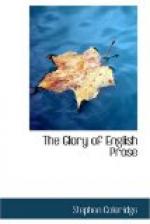Your loving old
G.P.
[Footnote 1: King’s Own Yorkshire Light Infantry.]
2
MY DEAR ANTONY,
I alluded, in my first letter to you about English literature, to the necessity of your learning from the beginning the wide distinction between what is good and what is bad style.
I do not know a better instance of a display of the difference between what is fine style and what is not, than may be made by putting side by side almost any sentence from the old authorised translation of the Bible and the same sentence from The Bible in Modern Speech.
I will just put two quotations side by side:—
“Consider the lilies
of the field, how they grow; they toil not,
neither do they spin:
and yet I say unto you, That even Solomon in
all his glory was not arrayed
like one of these.”
“Learn a lesson from
the wild lilies. Watch their growth. They
neither toil nor spin, and
yet I tell you that not even Solomon
in all his magnificence could
array himself like one of these.”
Here you can feel the perfect harmony and balance of the old version and the miserable commonplaceness of the effort of these misguided modern men.
Again:—
“Repent ye: for the kingdom of heaven is at hand.”
This is mauled into:—
“Repent, he said, for
the kingdom of the heavens is now close at
hand.”
These examples are perfectly suited to illustrate the immense difference that separates what is noble and fine in style and what is poor and third rate.
If you recite the old version aloud you cannot escape the harmony and balance of the sentences, and nothing dignified or distinguished can be made of the wretched paraphrases of the two desecrators of the splendid old text.
And, Antony, I would have you know that I, who have spent a long life in precious libraries, loving fine literature with all my heart, have long ago reverenced the old version of the Bible as the granite corner-stone upon which has been built all the noblest English in the world. No narrative in literature has yet surpassed in majesty, simplicity, and passion the story of Joseph and his brethren, beginning at the thirty-seventh and ending with the forty-fifth chapter of Genesis. There is surely nothing more moving and lovely in all the books in the British Museum than the picture of Joseph when he sees his little brother among his brethren:—
“And he lifted up his
eyes, and saw his brother Benjamin, his
mother’s son, and said,
Is this your younger brother, of whom ye
spake to me? And he said,
God be gracious unto thee, my son.
“And Joseph made haste;
for his bowels did yearn upon his brother:
and he sought where to weep;
and he entered into his chamber, and
wept there.”




